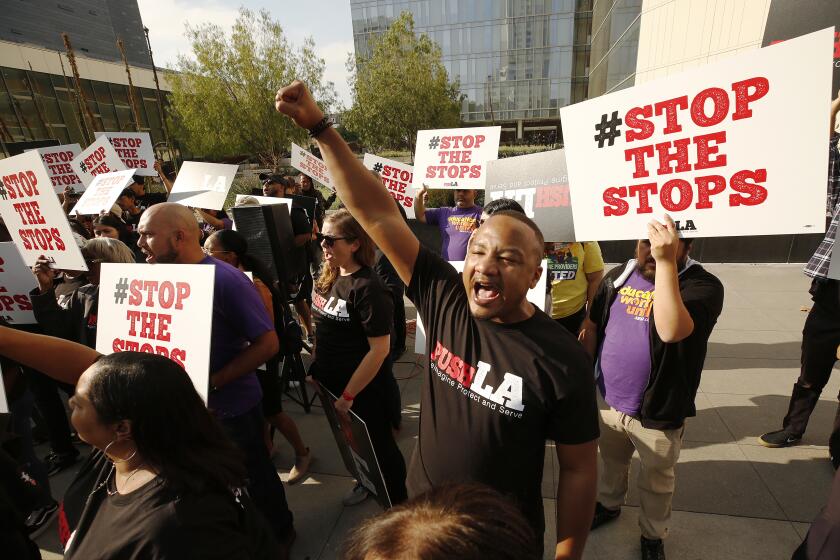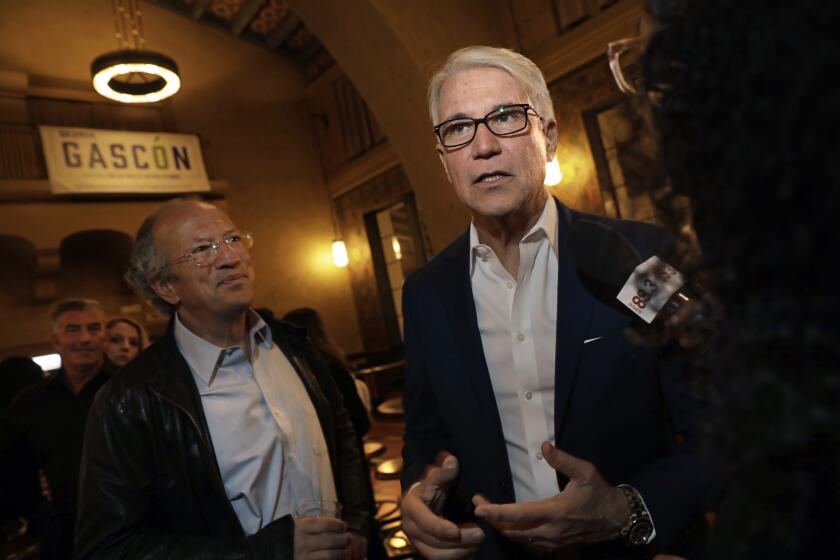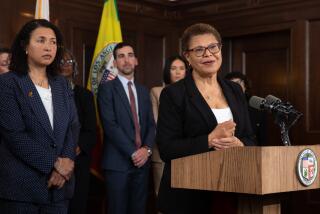L.A.’s deal with the police union would guarantee $245 million in overtime pay

A tentative deal between Los Angeles Mayor Eric Garcetti and the leadership of the police union would guarantee $245 million in cash overtime pay for officers, locking in substantial personnel costs just as law enforcement spending is under major scrutiny.
To get the union to postpone two pay raises, Garcetti has offered officers at the Los Angeles Police Department a minimum of $70 million in overtime pay in each of the next three budget years. On top of that, officers would be permitted in the final year of the contract to cash out as much as $35 million in overtime pay for hours they’ve already worked, but for which they have not been compensated.
The latter deal point stems from a little-known budgeting practice called overtime banking, which the LAPD uses to pay for personnel costs when the money isn’t immediately available.
Under that system, officers work overtime hours but frequently aren’t paid for those hours until years in the future — usually when they retire or leave the department, when their salaries are considerably higher.
The practice has been compared to the use of an expensive credit card, allowing the city to put off payment of millions of employee hours while obscuring the LAPD’s true overtime costs. Since July, the start of the city’s fiscal year, police officers have worked more than 400,000 overtime hours without being paid, time valued at nearly $28 million, according to department figures.
LAPD officers are voting on the tentative agreement, which would extend the union’s contract two years, or until June 2024. Union officials, who have recommended a yes vote, say the offer of a $35-million cash-out period in 2023-24 would allow officers to be compensated for some of their banked overtime hours earlier than planned.
The LAPD quietly returned tactical officers to crime suppression and vehicle stops in South L.A. and other neighborhoods in recent weeks as gun violence continued to escalate into the new year.
“That can be particularly important for younger officers, who might not otherwise see the money for 20 years, but also for older officers who are trying to feed their families and who may have a spouse who has had reduced hours during the pandemic,” said Dustin DeRollo, spokesman for the Los Angeles Police Protective League.
Officers have until the end of Saturday to cast ballots. Meanwhile, the deal has already drawn criticism from one activist, who described it as the latest example of Garcetti and council members favoring spending at the LAPD at the expense of other city agencies.
Akili, an organizer with Black Lives Matter-Los Angeles, said he fears the union agreement will create new obstacles for activists seeking to defund the LAPD, by contractually obligating the city to pay minimum levels of police overtime. Black Lives Matter and other groups have been pushing city leaders to shift money out of the LAPD and into other services, such as rent relief and affordable housing.
“The city is choosing to invest in police and not to invest in communities, not to invest in people, and that sends a powerful message to many of us,” said Akili, who goes by a single name.
The tentative deal with the police union is one of several negotiated by Garcetti and the city’s bargaining committee in an attempt to cut costs in the 2021-22 budget year. Under the agreement, the city would drop its plan for laying off up to 355 police officers by June 30. In exchange, the union would postpone two pay increases — 3% in January and another 1.5% in June 2022.
If the deal is ratified, those raises would go into effect in January 2023.
Garcetti spokesman Alex Comisar said in an email that the tentative deal would help the city navigate an unpredictable economy while also keeping Angelenos safe. Police Chief Michel Moore also spoke in favor of the agreement, saying it would be “workable” for the LAPD and in the best interest of public safety.
The city’s promise of $70 million in yearly cash overtime still falls well below the amount currently budgeted by the LAPD. The department has allocated about $102 million for overtime this year, with the vast majority going toward public transit patrols. The Metropolitan Transportation Authority reimburses the LAPD for those patrols.
The issue of overtime pay emerged as a hot-button issue within the LAPD last summer, after Garcetti and the City Council cut the department’s budget by $150 million, a move announced abruptly in the wake of massive protests over police brutality following the death of George Floyd in Minneapolis.
The LAPD absorbed much of that reduction by slashing cash overtime, infuriating many of the rank-and-file officers who had come to expect that extra money as part of their income.
At the time, the city’s budget analysts warned council members that the LAPD would likely respond by increasing the number of hours that its officers bank.
Since then, police officers have already racked up nearly $28 million in overtime — money now owed to them by the city — with more than four months still left in the budget year.
Councilman Bob Blumenfield, who sits on the powerful Budget and Finance Committee, declined to weigh in on the terms of the deal with the police union, saying he was not part of the negotiations. But he argued that banked overtime hours only become more expensive as the years pass, as officers who worked that time receive promotions and pay increases.
“I’m all for trying to cash out [the overtime] if we can afford it — to cash out that bank as much as we can,” he said.
Elected officials at City Hall have a history of letting the LAPD’s overtime bank grow during economic downturns. During the financial crisis that followed the 2008 recession, Mayor Antonio Villaraigosa twice increased the number of overtime hours officers could bank, which helped him preserve his initiative to expand the size of the LAPD.
By the time Villaraigosa left office, the bank had grown to 2.6 million overtime hours, with the city owing officers $130 million, according to figures from the City Administrative Office. After five strong budget years, Garcetti and the council managed to chip away at that figure, scaling it back to about $108 million in 2018-19.
George Gascón wants the attorney who won federal convictions in the Rodney King beating to oversee police misconduct investigations in L.A. County.
In the wake of the COVID-19 outbreak, and the financial crisis that accompanied it, the bank has climbed again to $144 million, or 2.3 million hours, according to the LAPD. Some of the increase can be traced to major incidents last fall.
When the Lakers won the NBA title in October, and crowds grew disorderly outside Staples Center in downtown Los Angeles, the LAPD responded with officers in riot gear. The department racked up more than 5,800 hours of overtime on those two days.
Weeks later, the LAPD braced for similar gatherings as the Dodgers entered and ultimately won the World Series. On Oct. 27 and 28, officers worked more than 7,500 hours of overtime. And in early November, fearing there would be unrest around the presidential election, the department again brought in more officers to work overtime.
Overtime costs associated with those six days topped more than $1.5 million. But the department only paid about $140,000 in cash, banking the remaining hours and leaving payment for future years.
Comisar, the Garcetti spokesman, said it makes sense for the city and the LAPD to pay down a portion of the overtime bank, helping the city reduce its financial liabilities and allowing officers to be compensated for time they’ve already worked.
“It’s in the best interests of both the officers who have worked the OT and the city to settle up from the bank sooner rather than later when we can,” he said.
More to Read
Start your day right
Sign up for Essential California for news, features and recommendations from the L.A. Times and beyond in your inbox six days a week.
You may occasionally receive promotional content from the Los Angeles Times.









